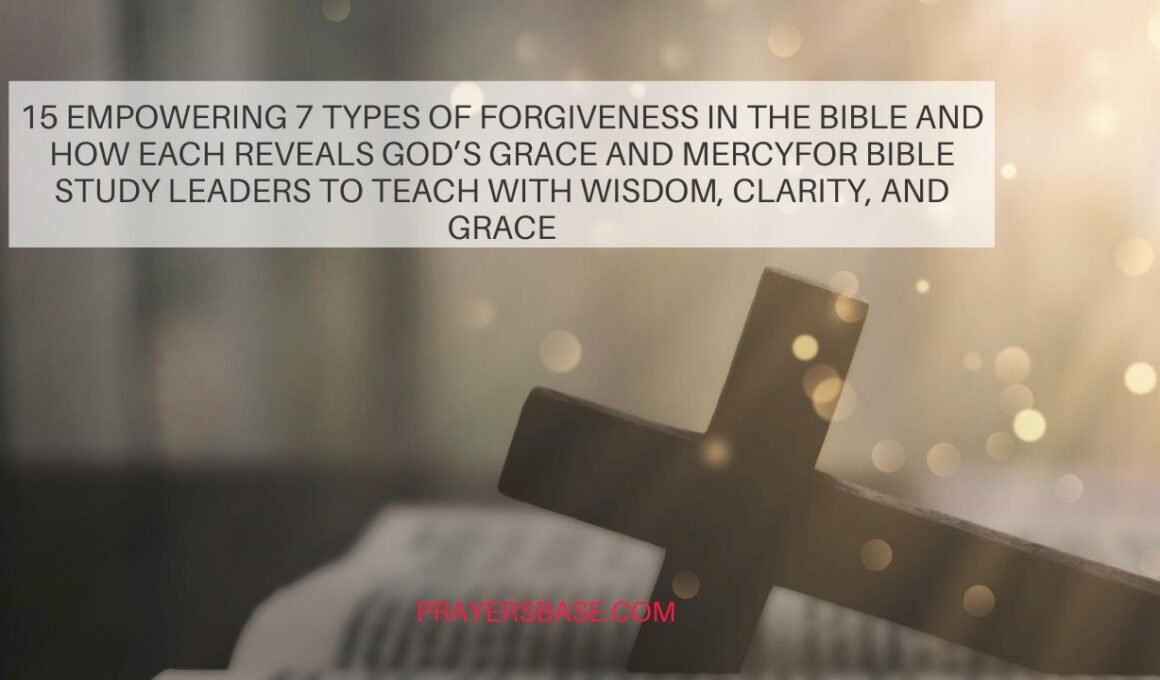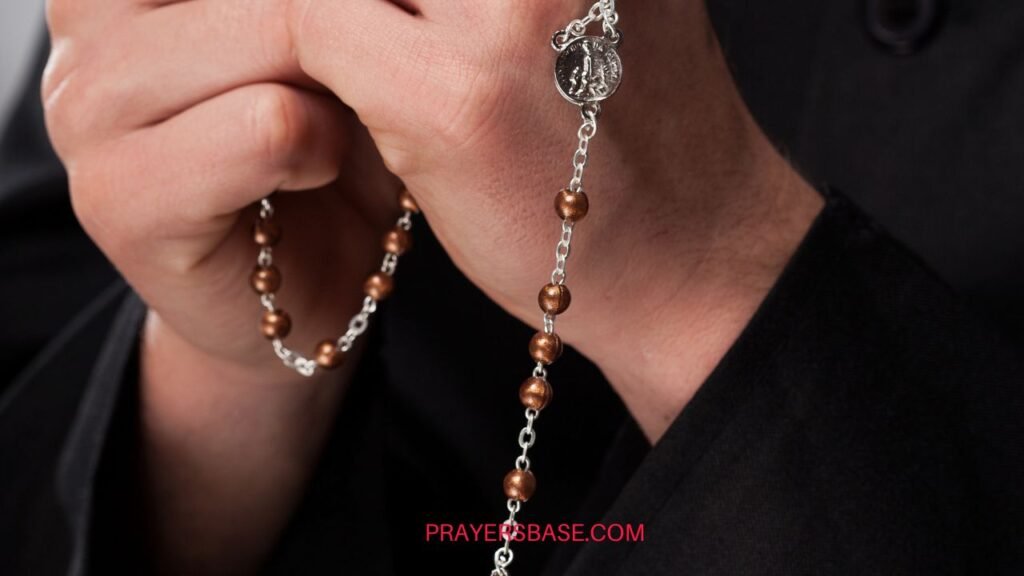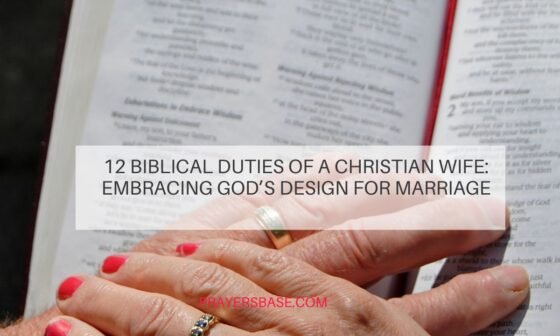Forgiveness runs through the entire Bible like a golden thread. From Genesis to Revelation, God reveals Himself as compassionate, patient, and ready to forgive. But forgiveness isn’t just one simple act—it shows up in many different ways.
Sometimes it looks like mercy. Other times it feels like freedom. And sometimes it takes the shape of deep restoration after broken trust.
In this article, we’ll explore 7 types of forgiveness in the Bible—each one revealing something powerful about God’s grace and how He wants us to forgive, too.
What Does the Bible Say About Forgiveness?
Forgiveness, in biblical terms, means to release, to cancel, or to cover a debt. It’s not just forgetting what happened—it’s choosing not to hold something against someone anymore.
God describes Himself as “slow to anger and abounding in love, forgiving wickedness, rebellion, and sin” (Exodus 34:6–7). That theme repeats over and over: God is just, but He’s also full of mercy.
Jesus taught that forgiveness is not optional for His followers. In Matthew 6:14–15, He said, “If you forgive others… your heavenly Father will also forgive you.” It’s clear that how we forgive is deeply connected to how we’ve been forgiven.
Why Understanding Different Types of Forgiveness Matters
Many people struggle with forgiveness because they only see it one way. But the Bible shows us different types—each with a unique purpose.
Some forgiveness leads to reconciliation.
Some forgiveness is personal and quiet.
Some forgiveness is legal (God declaring us not guilty).
Some forgiveness helps us let go, even if the other person never changes.
When we understand these layers, we stop asking, “Am I doing it right?” and start asking, “What kind of grace is God showing here?” That shift can bring real healing—not just for us, but for those around us too.
7 Types of Forgiveness in the Bible and How Each Reveals God’s Grace and Mercy
The Bible doesn’t talk about just one kind of forgiveness. It reveals several types—each with a unique purpose and a glimpse into God’s heart. Some types restore our relationship with Him, others help us heal from wounds, and a few challenge us to extend mercy even when it’s hard.

These seven examples of biblical forgiveness show us how wide God’s grace reaches—and how we’re invited to live that grace out in everyday life.
1. God’s Forgiveness of Sins
📖 1 John 1:9 – “If we confess our sins, He is faithful and just to forgive us our sins and to cleanse us from all unrighteousness.”
This is the most foundational type of forgiveness in the Bible: God forgiving us.
When we come to Him in honesty—admitting our wrongs and turning from them—He doesn’t shame us or hold it over us. He forgives us completely, cleansing us and giving us a new start.
This forgiveness isn’t based on how we feel or what we deserve. It’s based on Jesus’ finished work on the cross. Because of Him, we can be free from guilt and shame. As Psalm 103:12 says, “As far as the east is from the west, so far has He removed our sins from us.”
God’s forgiveness shows us just how wide, deep, and personal His grace really is.
2. Interpersonal Forgiveness (Forgiving Others)
📖 Ephesians 4:32 – “Be kind and compassionate to one another, forgiving each other, just as in Christ God forgave you.”
This is the forgiveness we extend to other people—friends, family, coworkers, even enemies.
Jesus taught that because we’ve been forgiven, we are called to forgive others. Not when they apologize. Not when they change. But from the heart (Matthew 18:21–35).
This doesn’t mean excusing wrong or pretending it didn’t hurt. It means letting go of revenge, bitterness, and the need to get even. It means trusting God with the outcome and choosing peace over punishment.
When we forgive, we reflect God’s character in a world that desperately needs mercy.
3. Self-Forgiveness (Receiving God’s Grace for Yourself)
📖 Romans 8:1 – “Therefore, there is now no condemnation for those who are in Christ Jesus.”
Sometimes the hardest person to forgive is… yourself.
Even after God forgives us, we can still carry guilt and shame. We replay our past mistakes and let them define us. But Scripture reminds us that if God has forgiven us, we are no longer condemned.
Self-forgiveness isn’t about ignoring our past—it’s about accepting the truth that Jesus paid it all, and we don’t have to carry the weight anymore. Holding on to shame when God has let go is like saying His grace isn’t enough. But it is.
When we receive His grace for ourselves, healing can begin from the inside out.
4. Conditional Forgiveness (If They Repent)
📖 Luke 17:3–4 – “If your brother or sister sins against you, rebuke them; and if they repent, forgive them.”
This type of forgiveness is based on repentance. Jesus taught that if someone wrongs you and comes back truly sorry, you should forgive them—even seven times a day if needed.
Conditional forgiveness reminds us that true reconciliation takes honesty and humility. It doesn’t mean we wait for an apology before releasing bitterness—but it does mean full restoration happens when both sides are willing to heal.
It reflects God’s nature, too: while He offers forgiveness freely, we still have to come to Him in repentance and faith.
5. Unconditional Forgiveness (Letting Go Without Repayment)
📖 Luke 23:34 – “Father, forgive them, for they do not know what they are doing.”
This is perhaps the most stunning form of forgiveness—when it’s offered freely, even without apology.
Jesus modeled this on the cross. As He was being crucified, He asked God to forgive His killers. Stephen, the first Christian martyr, did the same (Acts 7:60). Neither received an apology. But they forgave anyway.
This type of forgiveness is rooted in grace, not justice. It’s a reflection of God’s heart—a choice to let go of the offense, not because the person deserves it, but because you are free in Christ.
6. Judicial Forgiveness (God Declaring Us Righteous)
📖 Romans 5:9 – “Since we have now been justified by His blood, how much more shall we be saved from God’s wrath through Him!”
Judicial forgiveness is a legal term. It means that God, the Judge, looks at our record—full of sin—and wipes it clean because of what Jesus did on the cross.
We’re not just pardoned—we’re declared righteous. The debt has been paid in full.
This type of forgiveness reveals the depth of God’s mercy and the seriousness of sin. God didn’t ignore our wrongs—He dealt with them completely through Christ.








